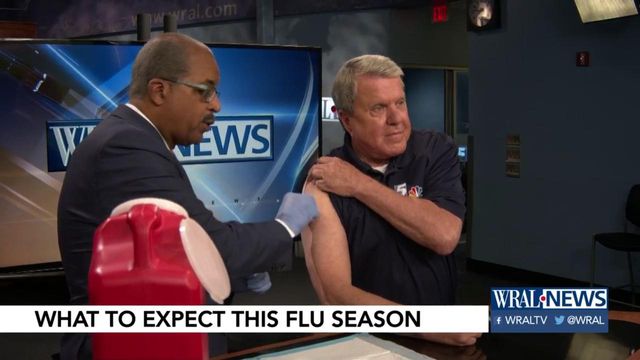Fighting the flu - do you know what to do?
If you think you or a loved one might have the flu, prompt action is your best bet. Here's our top tips for managing the flu this year.
Posted — UpdatedNationally, the CDC estimates that there have been at least 3.7 million cases, 32,000 hospitalizations and 1,800 deaths from the flu so far.
What to Do About the Flu
If you think you or a loved one might have the flu, prompt action is your best bet. Here's our top tips for managing the flu this year.
If you are symptomatic for flu, treat yourself for the flu.
You could still have the flu, even if a rapid test result is negative. The rapid test, which is often done in urgent cares, pharmacy clinics and physician offices, is only about 50 to 70 percent accurate when they give a negative result.
If you have the symptoms, always treat yourself as if you have the flu. Stay rested, hydrated and home. Antiviral medications are only effective if administered within the first 48 hours of onset of symptoms.
If your doctor recommends antiviral medication, get your prescription filled and take it right away. Otherwise, your doctor will likely tell you to get a lot of rest and drink plenty of fluids.
You doctor may also recommend over-the-counter medications for fever and cough – be sure to take them according to your doctor's orders and make sure not to take more than recommended. This is particularly important when taking medications such as NyQuil or other blends; many people don't realize that NyQuil contains acetaminophen (Tylenol), which may lead to an unintentional overdose.
The flu is serious business.
Not only can the flu cause serious health complications and even death, it can also cause or aggravate other underlying conditions. Take note of the following warning signs to look for in both adults and children.
In children, emergency warning signs that need urgent medical attention include:
- Fast breathing or trouble breathing
- Bluish or gray skin color
- Not drinking enough fluids
- Severe or persistent vomiting
- Not waking up or not interacting
- Being so irritable that the child does not want to be held
- Flu-like symptoms improve but then return with fever and worse cough
In adults, emergency warning signs that need urgent medical attention include:
- Difficulty breathing or shortness of breath
- Pain or pressure in the chest or abdomen
- Sudden dizziness
- Confusion
- Severe or persistent vomiting
- Flu-like symptoms improve but then return with fever and worse cough
Planning and Prevention
Every year, five to 20 percent of all United States residents get sick with flu. While the severity, exact timing and length of flu season vary annually, the strategies to help prevent flu do not.
Planning and prevention are the best defenses against illness.
Prevent the flu or reduce your chances of contracting the flu by doing the following:
- Get the flu shot
- Practice good hand hygiene and respiratory hygiene.
- Keep the surfaces in your home clean.
- Get quality sleep.
- Eat quality, healthy food.
- Always keep your hands out of your face.
- Avoid people who are sick
- If you're sick with the flu, stay home!
Flu Treatment – Where to Go
- Primary Care – If you need flu testing or treatment during normal business hours, check with your primary care doctor first. This is especially true for the very young, very old, pregnant women, people with a BMI greater than 40, and people with an underlying chronic health condition such as asthma or COPD. If you are a higher-risk individual, it is a good idea to visit a primary care physician if you think you have the flu. Primary care is typically the least-expensive treatment option, and it's best to work with a physician who knows you, your medical history and medications.
- Urgent Care – Urgent Care locations offer extended hours, most of the time until 8 p.m., and offer flu testing and treatment. This is a good option if you're unable to get a doctor's appointment with your primary care physician, or if it's after regular business hours and your doctor's office is closed.
- Emergency Department – Emergency Departments are open 24 hours a day, every day. If your condition is life-threatening or no other level of care is open, visit your nearest location.
- Virtual Urgent Care – Available via the WakeMed mobile app, virtual care options are available 24 hour a day, 7 days a week from anywhere in North Carolina. While you can't get tested for the flu virtually, physicians can evaluate you, offer guidance and write prescriptions for nasty symptoms such as a cough.
Related Topics
• Credits
Copyright 2024 by Capitol Broadcasting Company. All rights reserved. This material may not be published, broadcast, rewritten or redistributed.






